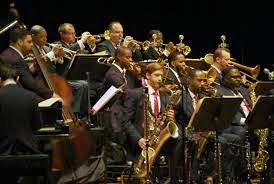Cliche-free concert of Christmas-related music makes up Jazz at Lincoln Center Orchestra program at the Palladium
 |
| The Jazz at Lincoln Center Orchestra in full cry. |
With Marsalis as featured trumpet soloist and master of ceremonies, the most eminent American big band now working presented a program neatly divided into six numbers in each of two sets. A notable standout among those dozen performances was guest vocalist Cecile McLorin Salvant.
Salvant personalized "What Child Is This?," restoring a sense of wonder to the text on the age-old melody "Greensleeves." The arrangement opened with a chordal onslaught by the J@LC's stellar sax section, then quickly settled into something more intimate and worshipful once the vocal started.
Her singing was witty and illuminating in more obscure pieces as well. Among them was Louis Armstrong's "'Zat You, Santa Claus?," with its novelty-number door knocking and the wary response to it of the singer, who hopes for a present that can be slipped under the door by the Right Jolly Old Elf.
Salvant displayed her scat-singing ability in "It's Easy to Blame the Weather." Her affinity for this seasoned technique seemed more an extension of her loose textual phrasing — as adaptable, deep-delving and surprising as Sarah Vaughan's — than a set of tricks drawn out of a handy vocal bag.
In being all decked out in a splendid arrangement, that little-known song was typical of what the 15-member band played throughout. Alto saxophonist Sherman Irby's arrangement featured a poised, well-built trombone solo by Vincent Gardner.
Also striking was the exotic setting put behind "We Three Kings of Orient Are" by arranger-saxophonist Ted Nash. The arrangement comprised an arresting contrast between the main section and the "Star of wonder" bridge. The band had served notice that its program would be cliche-free by the glinting, fresh energy it gave to "Jingle Bells" to open the show — featuring a lengthy, adroit solo by Marsalis.
Reminders of other music stayed subtle in arrangements that were sophisticated but never glibly parodistic. The opening of "I'll Be Home for Christmas," a hit during the Second World War, when the conflict split apart so many families, obliquely recalled Aaron Copland's contemporary "Fanfare for the Common Man." Salvant gave the song an aching quality without an ounce of affectation. The American common man, serving the cause of freedom under duress on two fronts, could promise to be home for Christmas "only in [his] dreams."
All the soloing was pungent and fully focused, except for a James Chirillo guitar outing in "I've Got My Love to Keep Me Warm" that faltered before he yielded the spotlight. The fleet, soulful piano playing of Dan Nimmer was put on extended display in a trio version of "Santa Claus Is Coming to Town," as was the zesty upright bass of Carlos Henriquez. Trumpeter Ryan Kisor and baritone saxophonist Paul Nedzela — withheld from being singled out until the last piece, "Good Morning Blues" — made up for lost time with their muscle-flexing moments in the sun.
Trumpeter Marcus Printup contributed the perfect rouser to end the concert's first half: an arrangement of "Go Tell It on the Mountain" that promised righteous testifying right from the trombone section's statement of the melody. The high-spirited performance included a friendly tenor-sax duel between Victor Goines and Walter Blanding and a rocking dialogue between percussionist Ali Jackson on tambourine and trombone soloist Chris Crenshaw.
And the program's most overplayed, overperformed seasonal association — with Irving Berlin's "White Christmas" — also stayed free of "been there, heard that" status as Marsalis and the band interpreted it without a vocal. Muted trumpets, a fine muted solo from Crenshaw and a heart-stopping full-band diminuendo at the end signaled the J@LC Orchestra's appeal to both the appetite for seasonal comfort food and the restless, hopeful search for novelty that tends to characterize the turning of the year for all of us.



Comments
Post a Comment